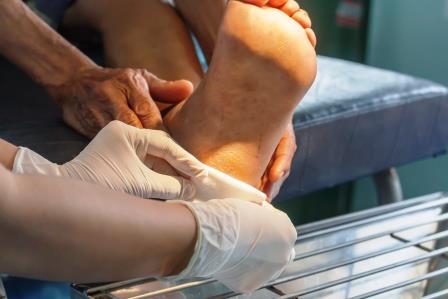Surgeons at Cleveland Clinic Abu Dhabi have successfully prevented a diabetes-related amputation in a 45-year-old Emirati patient through a new procedure to treat peripheral artery disease (PAD), a condition that causes the narrowing of the arteries delivering blood to the limbs.
In PAD, which is also known as atherosclerosis or hardening of the arteries, plaque gradually forms inside the artery walls. Plaque is made of excessive fat, cholesterol and other substances in the bloodstream that restrict the blood supply to organs and other tissues, causing tissue damage and eventually tissue death. Left untreated, the condition causes severe pain in the limbs, and can also lead to heart attack or stroke.
 Emirati national Mohamed Al Marzooqi arrived at Cleveland Clinic Abu Dhabi with a severe blockage in a leg artery, which had jeopardized the viability of his entire limb. He was referred to the multidisciplinary limb preservation team, which involves cardiologists, vascular surgeons, podiatrists, internal medicine specialists, and plastic surgeons, for a 360-degree approach to treatment and care.
Emirati national Mohamed Al Marzooqi arrived at Cleveland Clinic Abu Dhabi with a severe blockage in a leg artery, which had jeopardized the viability of his entire limb. He was referred to the multidisciplinary limb preservation team, which involves cardiologists, vascular surgeons, podiatrists, internal medicine specialists, and plastic surgeons, for a 360-degree approach to treatment and care.
“My father wears safety boots for long periods of time at work, which restricts the free movement of his feet. His wounds don’t heal quickly and that was causing him a lot of pain and impacting his daily activities,” said Mane’a Al Marzooqi, his son.
“After his latest injury we were told that the only solution would be to amputate his foot. I wanted to avoid such a drastic measure and came to Cleveland Clinic Abu Dhabi for a second opinion.”
Dr. Faisal Hasan, a cardiologist at Cleveland Clinic Abu Dhabi’s Heart & Vascular Institute, said that the patient presented with a major risk of amputation caused by atherosclerosis.
“The two main peripheral arteries that serve his leg were completely blocked and had caused wounds on his foot. We felt that by deploying a new procedure involving an innovative atherectomy device, we could improve the overall outcome and save the patient’s limb.”
The new minimally-invasive peripheral orbital atherectomy device, which was until recently only available in the United States, Germany and Japan, is now being deployed at Cleveland Clinic Abu Dhabi to address the growing incidence of PAD in the country, caused by increasing instances of diabetes, smoking, cholesterol and hypertension issues.
“With this technique, we could change the nature of the blockage by debulking and removing the plaque deposits to restore the blood flow to the extremities. The new procedure addresses an unmet need for minimally-invasive and less traumatic treatments for PAD in the UAE,” he added.
“The device treats calcified plaque in the arterial vessels in the leg and heart in a few minutes of treatment time and addresses many of the limitations associated with existing surgical, catheter and pharmacological treatment alternatives.”
Traditionally, patients with PAD have been treated with a balloon angioplasty procedure that involves widening the artery and flattening the plaque against the artery wall, after which a stent is placed to help restore blood flow.
Dr. Hasan said the new procedure does away with the need to implant stents that sometimes cause further complications.
“This treatment is also a better option for elderly patients for whom surgical methods, such as bypass, may present a greater burden of risk factors, particularly if we see them earlier. Patients in the UAE often seek treatment at advanced stages when gangrene has begun to develop, and that area has to be removed. But if they seek treatment when they notice chronic wounds, we can prevent an amputation altogether.”
The successful procedure enabled doctors to continue treating the patient’s affected foot by performing wound debridement and skin grafting for complete recovery, which would otherwise not have been possible in this case.
Mane’a said his father’s wound has now fully healed and he is looking forward to being pain-free.
“The doctors and staff at the hospital took very good care of him and he was very comfortable at the facility. The team was always helpful, and they have given us ways to manage his diabetes so that we can prevent such complications in the future.”
Cleveland Clinic Abu Dhabi’s limb preservation program brings together physicians from multiple specialties for individualized treatment plans to quickly and effectively treat PAD. The new procedure is among a series of pioneering treatments offered to expand the minimally-invasive options available to patients closer to home.
Let us help you book an appointment at Cleveland Clinic Abu Dhabi.